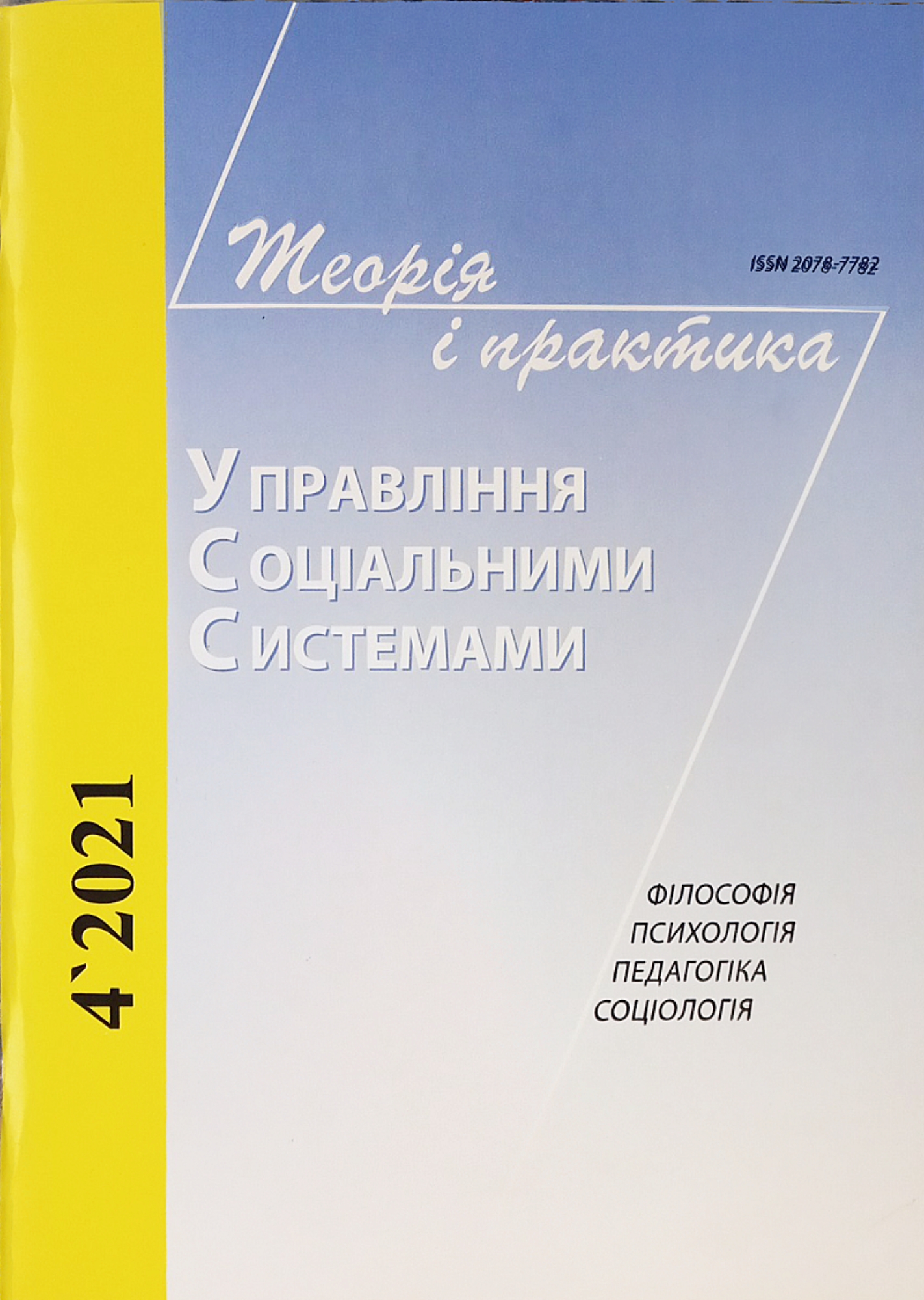ФОРМУВАННЯ У МАЙБУТНІХ УЧИТЕЛІВ НАВИЧОК SOFT SKILLS У ПРОЦЕСІ ВИКЛАДАННЯ НАВЧАЛЬНОЇ ДИСЦПЛІНИ “КОУЧИНГОВІ ТЕХНОЛОГІЇ В ОСВІТІ”
DOI:
https://doi.org/10.20998/2078-7782.2021.4.06Ключові слова:
гнучкі навички, формування, бакалаврський рівень вищої освіти, майбутні вчителі, коучинг, вибіркова дисципліна, коучингові технології в освітіАнотація
у статті розкрито зміст поняття гнучкі навички (soft skills), їхню роль і значення для професійного розвитку і кар’єрного зростання особистості. На основі аналізу Професійного стандарту за професіями “Вчитель початкових класів закладу загальної середньої освіти”, “Вчитель закладу загальної середньої освіти”, “Вчитель з початкової освіти (з дипломом молодшого спеціаліста”) визначено перелік гнучких навичок, якими має володіти сучасний педагог. Акцентовано увагу на важливості формування навичок soft skills у здобувачів вищої педагогічної освіти на етапі їхньої професійної підготовки.
На основі вивчення Освітніх програм підготовки здобувачів вищої освіти бакалаврського рівня за спеціальностями 013 Початкова освіта, 014 Середня освіта (за предметною спеціалізацією) визначено шляхи формування гнучких навичок в освітньому процесі. Розроблено і апробовано навчальну програму вибіркової дисципліни загального циклу підготовки “Коучингові технології в освіті” як додатковий ресурс формування у майбутніх учителів комунікативних навичок, лідерських компетенцій, навичок селф-менеджменту, інтелектуальних навичок.
Посилання
1. “10 professional skills that a person must master by 2020”, available at: 15.10.2021: http://tvoemisto.tv/news/10_profesiynyh_navychok_yakym_maie_ovolodity_lyudyna_do_2020_roku_76398.html.
2. Briggs S. “30 tips to cultivate soft skills in your students”, Open Colleges. InformED: website, available at: https://www.opencolleges.edu.au/informed/features/30-ways-to-cultivate-soft-skills-in-your-students/ 15.10.2021)
3. Haselberger D. et al. (2012), Mediating Soft Skills at Higher Education Institutions: “Guidelines for the design of learning situations supporting soft skills achievement”, California: Modes, p. 133
4. Heckman James J., Kautz Tim D. (June 2012), “Hard Evidence on Soft Skills”, Working Paper 18121; National Bureau of Economic Research, available at: http://www.nber.org/papers/w18121
5. Soft skills: universal skills of the European level, available at: 15.10.2021: https://studway.com.ua/soft-skills/
6. Abashkina O. (2008), “Softs kills: the key to a career”, Handbook of personnel mana-gement: scientific magazine, no. 9. pp. 124–126
7. Astakhova V. I. (2004), “Formation of a new educational paradigm at the turn of the century”, Scientific notes of the Kharkiv Humanitarian Institute “Native Ukrainian Academy”: Coll. of Science works, t. 10, pp. 9–25
8. Bober A. A. (2021), “Formation of softs skills in future primary school teachers”, Proceedings. Series "Psychological and pedagogical sciences" (Nizhyn State University named after Nikolai Gogol), vip. (1). pp. 117–124
9. Voronova S. V. (2018), “Coach techno-logy for the director”, Kharkiv: Osnova, p. 127
10. Dlugunovich N. A (2014), “Softs skills as a necessary component of training IT professionals”, Bulletin of Khmelnytsk National University, Technical science, no. 6, pp. 239–242
11. Koval K. O. (2015), “The develop-ment of “softs skills” in students is one of the important factors of employment”, Bulletin of Vinnytsia Polytechnic Institute, no. 2, pp.162–167
12. Kornyush G. V. (2020), “Formation of soft skills in students of higher education institutions in the context of learning foreign languages”, Teaching languages in higher education at the present stage. Cross-curricular links, issue 36, pp. 99–110
13. Skills that are valued in all professions, available at: 12.10.21: https://kadrovik.isu.net.ua/news/525119-navychky-yaki-tsinuyutsya-v-usikh-profesiyakh
14. Educational programs of the first (bachelor’s) level of higher education 2021. Center for licensing, accreditation and quality control of education of H. S. Skovoroda Kharkiv National Pedagogical University, available at: 14.10.2021: http://smc.hnpu.edu.ua/node/41
15. The list of disciplines of free choice of applicants of the first (bachelor’s) level of higher education. General training cycle, available at: 14.10.2021: http://smc.hnpu.edu.ua/studentu/dytsypliny-za-vyborom/10-studentu/19-bloky-vilnogo-vyboru-bakalavry
16. Podsosonna O. V. (2021), “Theore-tical bases of preparation of future primary school teachers for the development of flexible skills in junior schoolchildren”, Pedagogical sciences: realities and prospects, iss. 80, vol. 2, pp. 73–76
17. Regulations on the study of academic disciplines in the cycle of free choice of applicants KhNPU named after H. S. Skovoroda, available at: 14.10.2021: http://hnpu.edu.ua/sites/default/files/files/Normat_dokum/Piojenn/Pro_vuvchenya_navhalnyh_dusziplin_vilnogo_vybory.pdf
18. Regulations on the organization of the educational process at H. S. Skovoroda Kharkiv National Pedagogical University (in the new edition), available at: 14.10.2021: http://hnpu.edu.ua/sites/default/files/files/Normat_dokum/Piojenn/Pro_organisaziyu_osvitnogoz_procesy.pdf
19. Professional standard for the professions “Primary school teacher of general secondary education”, “Teacher of general secon-dary education”, “Primary teacher” (with a diplo-ma of junior specialist), available at: 12.10.2021: https://rada.info/upload/users_files/41868892/77dd4226add8e617afd9889da11634d8.pdf
20. Sagina T., Shunevych O. (2019), “Conditions for the development of flexible skills (softs skills) for teachers in the learning process in refresher courses”, Ukrainian pedagogical journal, no. 2, pp. 73–80
21. Khutorskaya A. Key educational competencies, available at: 15.10.2021. Osvita.ua, https://osvita.ua/school/method/2340

##submission.downloads##
Опубліковано
Номер
Розділ
Ліцензія
Авторське право (c) 2021 Людмила Зеленська

Ця робота ліцензується відповідно до Creative Commons Attribution-NonCommercial-NoDerivatives 4.0 International License.
Автори, які публікуються у цьому журналі, погоджуються з наступними умовами:- Автори залишають за собою право на авторство своєї роботи та передають журналу право першої публікації цієї роботи на умовах ліцензії Creative Commons Attribution License, котра дозволяє іншим особам вільно розповсюджувати опубліковану роботу з обов'язковим посиланням на авторів оригінальної роботи та першу публікацію роботи у цьому журналі.Автори, які публікуються у цьому журналі, погоджуються з наступними умовами:
